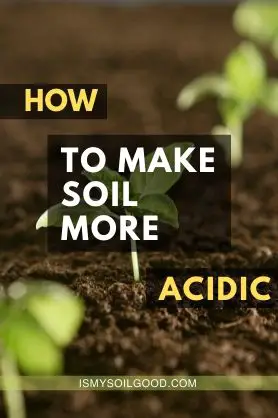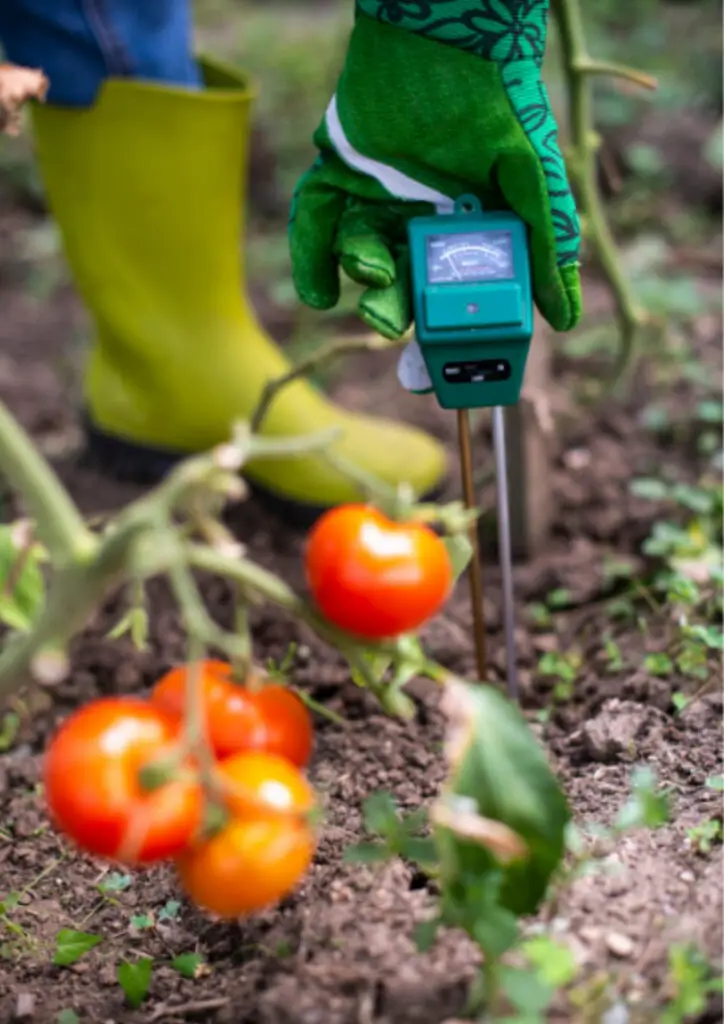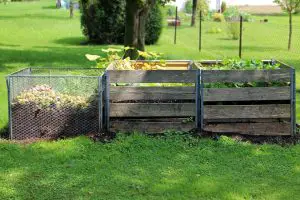We're an affiliate
We hope you love the products we recommend! Just so you know, we may collect a share of sales or other compensation from the links on this page. Thank you if you use our links, we really appreciate it!

Soil pH is one of the most critical factors that dictate the output of any garden. Every farmer needs to know how to make the soil more acidic or alkaline, depending on the crops grown.
Some crops such as blueberries require acidic soils to grow. Essentially, pH is a gauge that varies from 1 to 14. For soil to be classified as acidic, its pH has to be below 7. Any measurement above 7 is considered alkaline. Most plants prefer soils that are slightly acidic to neutral (6.5 to 7).
Before altering the acidity of your soil, you need to understand it. By this, we mean you have to test the soil first. The result you get will dictate the actions you take to rectify your soil’s pH.
In this article, we will take you through everything you need to know if you want to make your land more acidic.
Table of Contents
Test your Soil First

The first thing you need to do if you want to make the soil more acidic is to test your soil. The main objectives of soil testing are to know what your soil lacks and understand what you can do to improve it.
There are several home soil test kits available in the market that measure not only pH but also nutrient deficiencies. Modern home soil test kits are very accurate and give you recommendations on what you need to do to improve your soil.
Later in the article, we will highlight our top pH test kit. If the results indicate that your pH is above 7, it means that the soil is alkaline. This can be a problem if you want to grow ornamental plants such as flowers or even blueberries.
There are three primary acidifying materials used today (Sulphur, Aluminum Sulfate, and Ferrous Sulfate).
How to make the soil more acidic (Acidifying Materials)
1. Use Sulfur
2. Ferrous Sulfate
3. Aluminum Sulfate
4. Go Natural/Organic
5. Well-Decomposed Compost
6. Compost Tea
7. Mulch
8. Coffee Grounds
1. Use Sulfur
Sulfur is one of the most commonly used materials to lower soil pH. However, sulfur takes a while before it amends the acidity of your soil. As such, it is recommended that you add it a year before planting.
you must be aware of the importance of crop rotation. It is crucial that when you rotate your plants, you give the land at least one year to recoup its nutrients.
This is the right time to add sulfur and other nutrient-rich fertilizers/manure that you might want to use. It might take a while for sulfur to make your soil acidic- however, it lasts for many years.
Sulfur acidifies the soil by inducing bacteria available in the soil to turn it into sulfuric acid. You require at least 2 pounds of sulfur per 100 square feet. This can reduce the pH from 7 down to 4.5.
2. Ferrous Sulfate
Ferrous Sulfate is also known as Iron Sulfate. It relies on a chemical reaction to create acidity. However, unlike sulfur, it is not heavily dependent on temperature conditions. Additionally, iron sulfate works faster than sulfur. Its effect can be seen as early as three weeks after the initial application. You will require at least 10 pounds of iron sulfate for every 100 sq. Ft. of soil.
3. Aluminum Sulfate
Aluminum Sulfate is another fast-acting acidifying material. It produces acidity immediately after it dissolves in the soil. Flower farmers commonly use aluminum Sulfate. It is also referred to as the ‘blueing agent.’ This is because it gives flowers a deeper blue color in places where the soil is not acidic enough. Care should be taken when using Aluminum Sulfate since it can interfere with phosphorous levels if used in excess. Also, the continuous application of this material can lead to aluminum build-up, which poisons the soil.
4. Go Natural/Organic
Some gardeners are hesitant to use synthetic fertilizers on their farms. If you are an organic farmer and want to make the soil more acidic without using chemicals, this is the section for you. There are several organic ways of lowering soil pH (compost, compost tea, mulch, and coffee grounds)
5. Well-Decomposed Compost

The best way to organically lower your soil pH is by using well-decomposed compost.
Compost adds nutrients to your soil and also helps to amend the pH of your garden.
However, similar to other organic matter, it takes time for compost to make your soil acidic. But it has long-lasting effects, and it adds beneficial micro-organisms into the soil.
6. Compost Tea
Compost tea is a mixture of nutrients and oxygen-loving bacteria, fungi, nematodes, and other microbes that flourish in decomposed compost. It is used to acidify your soil and add fast-acting nutrients organically. To create compost tea, add well-decomposed compost into a bucket of water and let it sit for at least 48 hours. When it is done, pour it into a sprayer and water it around your garden.
7. Mulch
Mulch is most commonly used to protect the soil from erosion and water conservation. However, the right type of mulch can add an acidic boost to your soil. Use mulch from pine needles or oak leaves.
8. Coffee Grounds

After you take your morning coffee, be sure to save those coffee grounds and sprinkle them around your garden. When the coffee ground decomposes, it will slowly make your soil more acidic.
After you use any of the above materials, be sure to test your soil to see whether they were effective. Below are our top picks for pH soil test kits available in the market.
Products Review- Best Soil pH Testers
Comparison Table
| Manufacturer | Dimensions | Application | Weight | Rating | |
|---|---|---|---|---|---|
 Atree Soil pH Meter, 3-in-1 | Atree | 12.91 x 4.06 x 1.69 inches | pH, moisture and light intensity | 3.45 ounces |  |
 Luster Leaf 1605 Digital Soil Test Kit for pH, N, P and K | Luster Leaf products | 1.54 x 5.83 x 12.2 inches | pH, potassium, nitrogen and potash | 7.2 ounces |  |
 Gain Express Soil pH & Moisture Meter | Gain express | 5 x 4 x 5 inches | pH and moisture | 6.4 ounces |  |
 Sonkir Soil pH meter-MS02 3-in-1 | Sonkir | 11.5 x 2 x 1.5 inches | pH, moisture and light intensity | 2.71 ounces |  |
 HealthyWiser Soil pH Meter | HealthyWiser | 13 x 4 x 1.55 inches | pH, moisture and light intensity | 3.2 ounces |  |
1. Atree Soil pH Meter, 3-in-1

The Atree soil pH meter is among the few testers that you can trust to give you accurate results and see to it that your lawn is glossy and beautifully green.
A 3-in-1 design enables you to test the pH, light intensity, and moisture level in the soil. For all these functions, the price tag is very friendly. It is, therefore, very ideal if you want value for your money.
The tool’s design is such that it has two probes that you insert into the soil and dial where the readings are displayed.
To use it, first, push the switch to the dimension you want to measure- pH/Light/moisture- then insert the probes onto the soil for up to 4-6 inches. Adjust the probe until the pointer on the dial sways a little. Then read the dial for ten minutes.
2. Luster Leaf 1605 Digital Soil Test Kit

The luster leaf 1605 is known for its accuracy, ease of use, and pocket-friendly prices. The test comes with complete instructions and fertilization guidelines, making it extremely easy to use.
The luster leaf 1605 tests the soil for pH, Nitrogen, Potassium, and Potash using 40 test capsules, 10 for each of the tested elements.
The kit is based on reading colors and utilizes optics and LEDs to read them. Potash capsules are blue, potassium are orange, nitrogen capsules are purple, and the capsules for measuring pH are green.
The results are fast and accurate, as the kit is delicately calibrated to differentiate between the colors. The pH preference list is for over four hundred and fifty plants.
Furthermore, the kit comes with a booklet that provides you with all the information you need to know about the compatibility of crops and different pH levels.
3. Gain Express Soil Ph & Moisture Meter

If your value lies in the accuracy of the results, no matter what the cost is, Gain Express Soil pH and Moisture Meter is just the tool for you. With a pH accuracy level of ±0.2, it is about the most accurate soil tester there is.
It has a simple design consisting of an electrode that is 295 inches long. The dual meter measures the soil’s pH level, but it also tests for soil moisture in measurements between one (dry) and eight (wet).
The design is durable since it does not require batteries or electricity to operate, which makes it ideal for long-term purchase.
4. Sonkir Soil pH meter-MS02 3-in-1

If you are a passionate gardener or a person who loves a green, healthy lawn, then the Sonkir Soil pH Meter is a must-have in your toolbox.
The tool is a three-way design that fulfills not one, but three of your gardening needs. It has functionalities to test the soil moisture, pH, and light penetrating the soil.
Thus, you will know when the soil needs more water when the pH level needs adjustment, and if the plants are getting enough sunlight.
The readout scale is calibrated and has advanced needle technics to ensure precision. Furthermore, it has an enlarged scale space to make reading easier, especially for users with less-than-perfect vision.
The light sensor has measurements of between 0 and 2000LUX. pH is measured in values of between 3.5 for most acidic to 8 for most alkaline.
As for the moisture sensor, red indicates dry soil and green is when the soil is just moisturized enough, and it will turn blue when the soil is wet.
The tool provides relatively quicker and more accurate results than other soil pH meters, thanks to the premium double-needle detection technology. It is easy to use and light enough to carry around.
5. HealthyWiser Soil pH Meter

Just like the name suggests, a healthy lawn or garden requires wise decisions regarding the tools used. Thus, HealthyWiser is a wise purchase if you aim for green and lush lawns and healthy gardens.
The three-way meter measures soil moisture, light intensity, and the pH of the soil. It is made up of two probes that are inserted into the soil to get accurate, precise readings in a time frame of ten minutes.
Its ease of use is very appealing. Furthermore, it does not require batteries or gimmicks- it can be used for repeated projects over a long period.
Conclusion
Most crops require soils that are neutral or slightly acidic. However, certain plants, especially flowers or blueberries, love acidic soils.
If you are planning to grow, any of these plants ensure to test your soil using the above-recommended kits. If the pH is above 7 use, any of the methods highlighted in this text to reduce it. You can even combine different approaches for better results.

